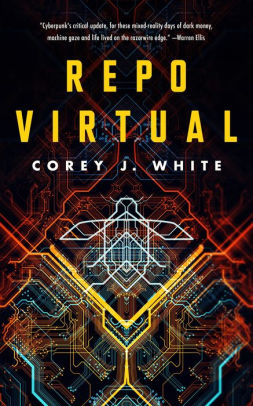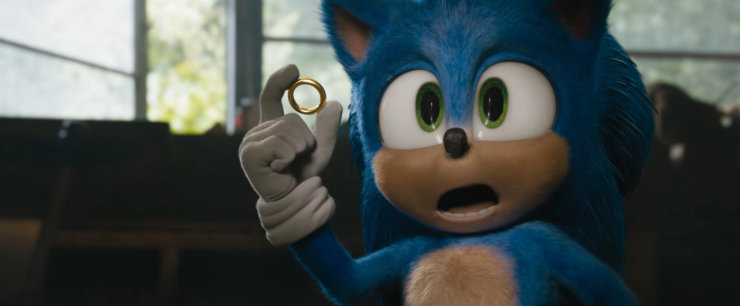When someone at work asks how I felt about Sonic the Hedgehog, I will say “It was great!” because they know me as “the guy who really likes Sonic” and not necessarily “the guy who has spent 50+ podcast hours talking about Sonic’s cultural impact and meaning” so they don’t need the full, complicated answer. But you clicked on this review, so you need the details. And the truth is: Sonic the Hedgehog is a fun movie, but it sacrifices Sonic’s messy and rebellious history to make Marvel-style comfort food.
The plot feels like standard superhero fare: Sonic (voiced by Ben Schwartz) has superpowers. His mother figure, an owl named Longclaw (voiced by Donna Jay Fulks) throws Sonic through a portal to Earth, to help him escape from a group of Echidnas who are hunting the baby hedgehog. He spends a decade hiding in small-town America developing an awkward patriotism and a love of the residents, his favorites being local cop Tom (James Marsden) and his wife, veterinarian Maddie (Tika Sumpter). Sonic, in a moment of loneliness, lets loose his powers, alerting the Pentagon to his presence, so they send their mad scientist on retainer, Dr. Robotnik (Jim Carrey), to catch him before he can escape off-world.
As an origin story for Robotnik, the movie is great. He’s an angry, insecure genius who spends every scene convincing others (and himself) that he’s the smartest man in the room. He doesn’t care about people and he sure doesn’t care about morals—he wants to prove his power and he’ll track down and capture any small animal in order to do it! The film, mostly pretty bland in setting and visuals, clearly prioritized the design of Carrey’s Eggman and his robots, to great effect. Plus, Carrey is having fun, bringing the same kind of energy that fueled his classic over-the-top roles in movies like The Mask or Ace Ventura; it’s refreshing and evokes nostalgia, even when the writing is a little awkward. (“Look what came out of my egg sac,” he says in his first scene.)
Sonic, on the other hand, is characterized much less clearly. He’s bored with his lonely life but uninterested in the big city charms of San Francisco when he visits on a road trip with Tom. He wants to be a hero but doesn’t really have anything to fight for, even when he’s insisting toward the end of the movie that (like fellow Smash Brother Ike) he fights for his friends. And yet Sonic’s friends are only in danger because he’s there.
Buy the Book


Repo Virtual
I should note that the new character design is gorgeous, by the way. I know he didn’t do it all on his own, but thank Solaris for animator/lead artist Tyson Hesse, who turns every Sonic property he touches into gold.
The jokes are more hits than misses, and there’s a rowdy sequence in a biker bar that stands alone as a great piece of sincere and true Sonic storytelling, even if it’s half-rehash of an X-Men: Days of Future Past scene. Overall, it’s safe to say that this movie will create a new generation of young fans, and that’s a really exciting thing! Sonic’s starred in some very bad media over the years, so any positive press is an improvement on what fans of the franchise are used to, but the truth is…even if this is a good movie, it’s a bad Sonic.
Here’s what I mean by that, to be clear: Sonic has always been an inherently rebellious, anarchic character. He is dismissive of all systems of power. At best, he embarrasses them. Usually, he is only interacting with institutions to destroy them (though, to be fair, the president sometimes makes an appearance in the games, but certainly not as an authority figure to be revered or respected.)
Sonic’s goal, for the past quarter-century, has always been to have fun and chill. He wants to play, to race, to hang out, to challenge himself, and to do all that without being accosted by evil robots. When he’s a hero, he’s a hero because he’s taking down an oppressive system—he’s obliterating an empire, he’s destroying a factory, and he’s making a fool of anyone who thinks they’re better than the little guy. But this movie takes all the potential of dropping this renegade character we know and love into the modern day and squanders it, completely changing Sonic’s personality and attitude to support a story that seems insistent on perpetuating the myth of an idyllic, small-town America that few viewers will be able to recognize.
An example: Midway through the movie, Sonic has his most emotionally potent scene. In it, he insists (to a police officer who is considering moving away to the Big City) that change is bad, that maintaining the status quo is important, and that a life of seeking challenge is a waste of time that will only hurt everyone around you. Officer Tom wants a chance to prove that he’s a real hero, but Sonic insists that his small town is the most important place on Earth, and doesn’t Tom understand that he’s from there, and everyone knows him?
The conflict feels a little forced, but it makes a certain amount of sense in the context of the plot. Movie Sonic has lived a decade isolated and alone and can’t imagine anything better than actually being seen and cared about by the townspeople of Green Hills. It’s understandable that a child left to raise himself might not understand why you’d throw away a life of being part of a community for a life filled with bigger challenges. I certainly believed that this version of Sonic, a child who wants a father figure, might feel like Officer Tom is abandoning him specifically, on a personal level.
But…why tell this story? Why take a hero who is traditionally a symbol of resistance against environmental destruction and systemic oppression and instead turn him into an outsider who so desperately wants in? Why take a fun, audacious character who has always been associated with brazen rebellion and make him best friends with an authority figure in the form of Sheriff Tom? For that matter, why make all the major characters of this movie adults? The creators of this film were clearly knowledgeable about Sonic, interested in giving him a fresh start, and competent when it comes to telling a story. So why tell a story where Sonic repeatedly insists that the lead shouldn’t follow his dreams? And why expect the audience to invest so much in the relatively basic dream of moving to San Francisco to be a street cop? It’s a very strange choice, overall.
Sonic is, explicitly, a freedom fighter. I hope he actually gets to be one in future movies.
On a side note, remember how the first trailer featured Coolio’s “Gangsta’s Paradise” as the backing track? The song thankfully didn’t end up in the movie, but what a weird choice in hindsight, now knowing what the movie is about… No one is even playing at defying the law in this film; Sonic acts like a child and Tom acts like a character from Sesame Street. They are briefly labeled “terrorists” by the government to keep the plot moving, but there’s no interrogation or even a mention of any realistic stakes or problems when it comes to corruption, violence, or abuse of power, even though there are some clear conflicts in play, here. At one point, there’s a throwaway joke where Robotnik says explicitly that his robots were paid for with American tax dollars. There’s a whole scene IN THE PENTAGON where it’s revealed that he is a mad scientist with a secret evil laboratory funded by the United States Government. That’s the exact same government that Officer Tom works for, and yet, that doesn’t seem to be an issue for anyone. The small-town police, even if they are as nice and well-meaning as the movie wants them to be, work for and enable the same system that empowers Dr. Robotnik, but the movie is not interested in that at all. In this story, Sonic isn’t interested in freedom fighting; he just wants to get adopted and eat at Olive Garden.
Which brings us to the subject of advertising and product placement: In this movie there are, by my count, three intentional commercials (Zillow once and Olive Garden at least twice), two incidental commercial moments (Amazon, Fitbit) and one perhaps accidental commercial (Optical Illusions Glasses; I think the script is making a joke, but a Google search reveals Robotnik was not being as original as he thought). Sonic has always been a corporate mascot, but Olive Garden’s slogan is literally quoted verbatim in this movie. One of the final shots is of a $50 Olive Garden gift card. It’s above and beyond even the usual amount of embedded marketing we’ve come to expect.
The mid-credits scene, which I won’t spoil here, reveals the real game: “This movie was just an origin story,” it seems to promise. “If you want to see the Sonic you know and love, please go eat some breadsticks.”
I do not want to eat a breadstick, but I do want a sequel. I genuinely want this movie to succeed so we can get a shot at a Sonic movie that actually tries to build on what the character of Sonic the Hedgehog is all about, rather than making a generic superhero film where a hedgehog named Sonic happens to be the protagonist. I want to see a free-spirited daredevil who stands against tyranny and truly does fight for his friends. Perhaps he could team up with some kind, heroic young people to help thwart a totalitarian regime, as he has in the past… (And somewhere in the mix, I’d also like to see Big the Cat fishing on the big screen! Why not?)
This isn’t that movie. But if it does well, then maybe we’ll get a sequel that lets Sonic be Sonic, so I’m hoping for the best. And in the meantime, at least he gets to eat some chili dogs…
Caleb Zane Huett is a children’s author (Top Elf), professional dungeon master, and co-host of Sonic the Hedgehog analysis podcast You’re Too Show. You can find him on twitter @czaneh if you spot any rare Sonic the Hedgehog clothes, and at calebzanehuett.com for anything more professional.










